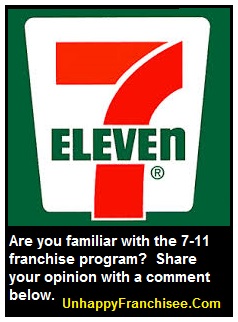7-Eleven Franchisees & Association Counsel Eric Karp Oppose AB-5 Franchise Exemption
The International Franchise Association (IFA), 7-Eleven franchisor SEI and many franchisors are pushing hard for a franchise exemption to newly enacted California law AB-5. In short, AB-5 makes it easier to argue (in some cases) that some franchisees should be classified as employees (not independent contractors) and should be granted the same protections and benefits as employees. In the video presentation below, General Counsel of the National Coalition of Associations of 7-Eleven Franchisees Eric Karp pushes back against 7-Eleven’s campaign which he claims is misleading and inaccurate.
(UnhappyFranchisee.Com) Why 7-Eleven franchisor SEI would oppose any tightening of restrictions on the classification of independent contractors is no mystery.
 7-Eleven franchisees are arguably the least “independent” contractors in all of franchising.
7-Eleven franchisees are arguably the least “independent” contractors in all of franchising.
Even among those in the franchise industry, few realize that:
- 7-Eleven franchisees own none of their own fixtures or equipment
- 7-Eleven franchisees are not party to the lease for their location; nor are utilities in their name
- 7-Eleven franchisees don’t control their own money, they must deposit all sales receipts into SEI’s business bank account
- 7-Eleven franchisees payroll and tax obligations must be funneled through SEI
- The thermostats and monitors in 7-Eleven stores are controlled by the Home Office in Dallas
- 7-Eleven franchisee businesses are monitored by the franchisor 24/7 via in-store surveillance
- While franchisor 7-Eleven, Inc. (SEI) is headquartered in Dallas, 7-Eleven’s “ultimate parent” is Seven and i, a Japanese corporation based in Tokyo, Japan
Related Post: 7-Eleven Franchisees Are Not Business Owners: NCASEF
7-Eleven Franchisee Coalition Video Featuring General Counsel Eric Karp (AB-5)
Transcript of Eric Karp’s 7-Eleven Franchisee Coalition Video RE: AB-5
My name is Eric Karp.
It is my privilege to serve as General Counsel of the National Coalition of Associations of 7-Eleven Franchisees. The National Coalition represents 42 state and local franchise owners associations, and since 1973 has been protecting the rights of franchise owners around the country. The National Coalition has asked me to speak to you today about 7-Eleven’s campaign to undermine the legitimate policy judgments of the California Supreme Court and the California legislature.
In what can only be called a full court press, 7-Eleven is pressuring franchisees to support an amendment to a California law which everyone is calling AB-5. 7-Eleven wants to exempt franchising from the definition of an independent contractor.
AB-5 codifies a decision of the California Supreme Court on the definition of an independent contractor. The misclassification case filed in California by 7-Eleven franchisees asks the court to find that while 7-Eleven promises to treat it franchisees as independent contractors, it has failed to do so. Unfortunately, 7-Eleven’s campaign is being supported by misleading and inaccurate statements.
If you listen to what your franchisor saying, you would assume that the world of franchising as we know it would come to an end if the law is not changed. That is simply not true.
Today, I want to set the record straight.
First, AB-5 does not contain a “new” definition of an independent contractor. Three-pronged test Greg Franks reviewed in his video has been the law in many states for many years where franchising has flourished, including since 2004 in my home state of Massachusetts, which has more than 200 7-Eleven franchisees.
Second, Mr. Franks misleadingly lumps 7-Eleven in with other mainstream franchisors, such as McDonald’s, Pizza Hut, KFC, Taco Bell and Dunkin’ Donuts. But this is an apples and oranges comparison. Those franchisors exercise far less control over their franchisees than does 7-Eleven.
Those franchisees are not required to deposit their gross receipts in a bank chosen by their franchisor and into an account owned by that franchisor, they own their fixtures and equipment, they control the real estate of the location through lease or purchase, and they are not under 24-7 surveillance from the franchisor’s home office.
Third, the three-part test does not apply to franchisees but to the system created by the franchisor. Put another way, it is not you that has to pass the three-prong test, it is up to 7-Eleven to create a system that allows its franchisees to actually function as the independent contractors they yearn to be.
Fourth, Mr. Franks’ parade of horribles conspicuously and conveniently fails to mention that for more than three years, 7-Eleven has adamantly refused repeated invitations to sit down at the bargaining table and create a fair, balanced and livable franchise agreement.
Sadly, it has instead elected to test this law in court, and in doing so could end up being liable for hundreds of millions of dollars of damages payable to franchisees. 7-Eleven is not trying to save franchising. It is trying to buy its way out of having to treat its franchisees fairly and in good faith.
In the end, this misguided effort to change an established law entirely misses the point. The franchise system created by 7-Eleven treats franchisees like glorified store managers. You are subject to a steady stream of top-down, do this or else mandates. 7-Eleven wants you to help it maintain a status quo that oppresses you and other franchisees, squeezes your profits and erodes the value of your businesses.
No, 7-Eleven, the solution to your problem is not to mislead franchisees into helping your expensive lobbyists to change the law.
The solution is to change the culture of your franchise system by making transparency and collaboration the consistent themes of your interaction with franchisees and the National Coalition, their elected representatives. The solution is to change the way you treat your franchisees, and to yes, change your deeply one-sided and unfair franchise agreement.
So the next time 7-Eleven asks you to support this exemption to AB-5, remember their true, but carefully unstated, motives. Just politely say, No.
And tell them to once and for all: Come to the bargaining table with the National Coalition and create a franchise agreement that reflects a fair and equitable balance of the risks and rewards of the franchise relationship.
I hope you, your families and your employees stay safe and healthy.
Thanks for listening.
ALSO READ:
FRANCHISE DISCUSSIONS by Company
7-ELEVEN on UnhappyFranchisee.Com [UPDATED]
7-ELEVEN Stole Our Store – Dev Patel’s Story
7-ELEVEN: How the 7-Eleven Franchise Works
7-ELEVEN: Is 7-Eleven a Good Franchise to Own?
ARE YOU A 7-ELEVEN FRANCHISEE OR FORMER FRANCHISEE? ARE YOU FAMILIAR WITH THE 7-ELEVEN FRANCHISE OPPORTUNITY AND CALIFORNIA AB-5?
PLEASE SHARE A COMMENT BELOW.
TAGS: 7-Eleven, 7-Eleven franchise, 7-Eleven franchise opportunity, 7-Eleven franchise complaints, 7-Eleven Franchisee Association, NCASEF, National Coalition of 7-Eleven Franchisee Associations, AB5, AB-5, California AB 5, Franchisee independent contractors, Eric Karp, Witmer Karp Warner & Ryan, WKWR, Joe DePinto, 7-Eleven Inc., unhappy franchisee, AB5 Franchise Exemption, Are franchisees independent contractors
